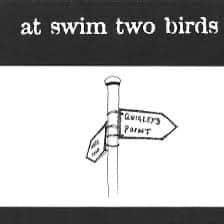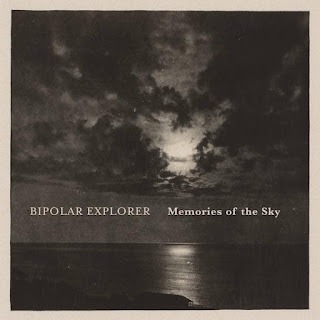At Swim Two Birds - Quigley’s Point
Vini Reilly è un mago che affitta scene celesti, Johnny Marr le trasforma in vento, Roger Quigley mette entrambi sui suoi polpastrelli dorati e affitta camere piccole in cui rendere solidi i sogni.
Potrebbe bastare questo incipit per dire dove alberga la cifra stilistica di un pittore che ha scritto un album sulla sua relazione di coppia con una ragazza dolcissima: la musica riproduce i suoi lineamenti, la sua risata accomodante, le polveri di fumo di pipe perennemente accese e la voglia di adoperare la sei corde come un tam tam amoroso sempre a disposizione dei suoi fulmini.
Non esiste il passato al momento della scrittura di queste lettere che cercano nella memoria una sospensione dal dolore, un urlo reso ubbidiente alla natura di una mente votata all’abbraccio.
Nutrire le lacrime di anestesie continue è una gran fatica. Lui lo sa e decide di pubblicare la sua delusione affiancandole granelli di gioia, con un cantautorato più sottile rispetto ai The Montgolfier Brothers che, con Mark Tranmer, avevano fatto scoprire come Nick Drake e Tim Buckley, con meno enfasi e maggior predisposizione al racconto, potevano sembrare dei bravi ragazzi, oltre che belli.
Poi la fine (Roger ne ha conosciute molte…) ha determinato il ritorno a Salford, lui che ci era nato, lasciando a Manchester solo alcune puntate mensili.
In una stanza annoiata e in attesa di un terremoto, il biondo autore riempie i posaceneri e gli spartiti, con arpeggi che passano dal folk americano al fado portoghese, al dream pop più intimo, per poi scrivere parole capaci di accarezzare i capelli dei suoi ricordi.
Il suo cantato è rispettoso, senza acredini, lasciando ai lunghi assoli arpeggiati la modalità della disintegrazione del dialogo.
Utilizza, per il suo primo vero episodio solista, registrazioni di strada, le sue camminate nei parchi, gli uccelli, i lavori in corso, sequestrando la nebbia di Weaste e Langworthy per poi circondarli di elettronica e primordiali software al fine di raggelare il suo respiro triste.
Sussurra al microfono, prende fiato tra nuvole di fumo e poi si getta nella scrittura di atmosfere che sembrano nate per un film in cui i volti e le storie sono intrisi di incertezza e desolazione ma, credete al Vecchio Scriba, sono state molte le risate sul pentagramma e la certezza che un disco non sia una collezione, bensì una semina importante e decisiva.
Anticipando parte del New Acoustic Movement, che utilizzava pattern, midi, elettronica tenera e mai invasiva, il buon Roger stabiliva un nuovo confine tra la divulgazione e il mistero.
Per capirlo basta prestare attenzione alle lunghe suite musicali dove un fraseggio viene ripetuto ma mai con l’intenzione di divenire un loop, dati gli inserti tipicizzanti degli arrangiatori degli anni Sessanta.
In quel preciso momento tutto si fa buio, scompaiono le storie e la musica diventa una bocca muta in grado di far oscillare le emozioni.
Sul manico della sua Takamine scivolano dita nervose, lucide, con il diploma della beatificazione, vista la perfetta tecnica e l’abilità di raddoppiare spesso la sei corde con compiti precisi di lavoro, come gemelle che parlano lingue diverse, senza far mancare l’intesa.
Il suo background qui non trova posizione: i suoi ascolti erano rivolti alla musica della città, mentre in questo esordio solista siamo in giro per il globo terrestre e nel tempo, come se la libertà vera fosse il distanziamento dalla realtà.
E infatti i testi sono inganni, torture, come le musiche: pare un collettivo magico che cerca di addentrarsi nel creato per abbracciare gli ascoltatori.
Invece Dante e il suo Inferno sono proprio in questi solchi, in passeggiate con abiti finti e tanto vero dolore a setacciare la speranza.
Il Brasile, il Portogallo, la Swinging London, Parigi e lo scrittore da cui ha preso il nome il suo progetto con un romanzo favoloso sono i protagonisti principali, seguiti da una pletora di sogni ingarbugliati.
La Sarah Records riconobbe a Quigley il fatto di conoscere a memoria la modalità di incespicare con pura sanezza nei contorti esercizi chitarristici di cui Reilly e Marr sono stati maestri assoluti.
Gli archi, i ritmi spesso volutamente dispari e la produzione che ha cercato di anestetizzare l’abbondanza dei suoni sono i momenti di maggior intensità di questo vascello Salfordiano che si ricorda bene del porto e delle lotte con Liverpool.
A quest’ultima città Roger dà molto spazio: nelle introduzioni di diverse canzoni la magica atmosfera del Merseyside del 1975 e 1976 sembrano spuntare fuori come raggi lunari in libera uscita.
Credo, però, che l’aspetto più difficile da sostenere sia l’inclinazione del defunto talento a congedare il tutto, tra goodbye e farewell che si abbracciano facendo sì che l’ascolto diventi una ferita, esattamente come la scrittura di questi versi ipnotici, ma capaci di essere anche deliziose ostinazioni piene di sorrisi e charme.
Colpiscono alcune assenze, certe decisioni che hanno portato alla scelta di rendere poco gonfio lo strato interpretativo se non nell’episodio I Need Him, nel quale la sua devastazione viene trasformata in una accomodante forma gentile nei confronti di parole rubate a una realtà che stabiliva la fine di una relazione.
Due lati diversi, con strutture e dinamiche che ruotano dentro una progettualità che prevede un cammino longitudinale, in grado, cioè, di trasmettere la muta della pelle della sua anima, come un forcone che affitta baci dal fieno.
La prima parte è un resoconto fedele di antiche felicità, la seconda un’amara constatazione del precipizio e infatti gli scenari stilistici cambiano.
Notevolissima è la tinteggiatura nell’ultimo brano fatto di coriandoli dream pop, da cui poi Tom McRae e i Radiohead hanno rubato a piene mani.
Sistematica modalità di una libertà pagata a caro prezzo, l’evoluzione del suo stile lo riporterà tra le braccia di Tranmer, anche se solo per un attimo. Ma questo album è un esercizio senza paragoni, vuoi per il romanticismo col cappotto nero e gli occhi che ancora cercano una bocca da sfiorare, che per canzoni che fanno riflettere su come la felicità sia solo l’avamposto della bomba atomica…
Un disco che ha generato orgasmi mentali e applausi da parte della critica: non si erano mai udite frammentazioni creare connessioni con la morbidezza, con l’educata propensione a grattugiare il lato meno duro di una decade che sembrava preferire i frastuoni ai sussurri.
Infatti certe esperienze toccano maggiormente quando si deve acuire l’ascolto.
E dopo più di vent’anni sembra che i segreti di questo gioiello continuino a emergere, facendo del volto delle sue composizioni uno splendido anfiteatro greco dove la poesia è un’arte inferiore: i versi di Roger sono immediati e riflessivi, non cercano la memoria, bensì il modo di dare a ogni attimo una rapida fuoriuscita…
Alex Demattteis
Musicshockworld
Salford
1 Dicembre 2024
https://open.spotify.com/album/4r8D9GORVR1xg7sMUS7hjl?si=eLO0-msNTnWai3rhVB-aEA














